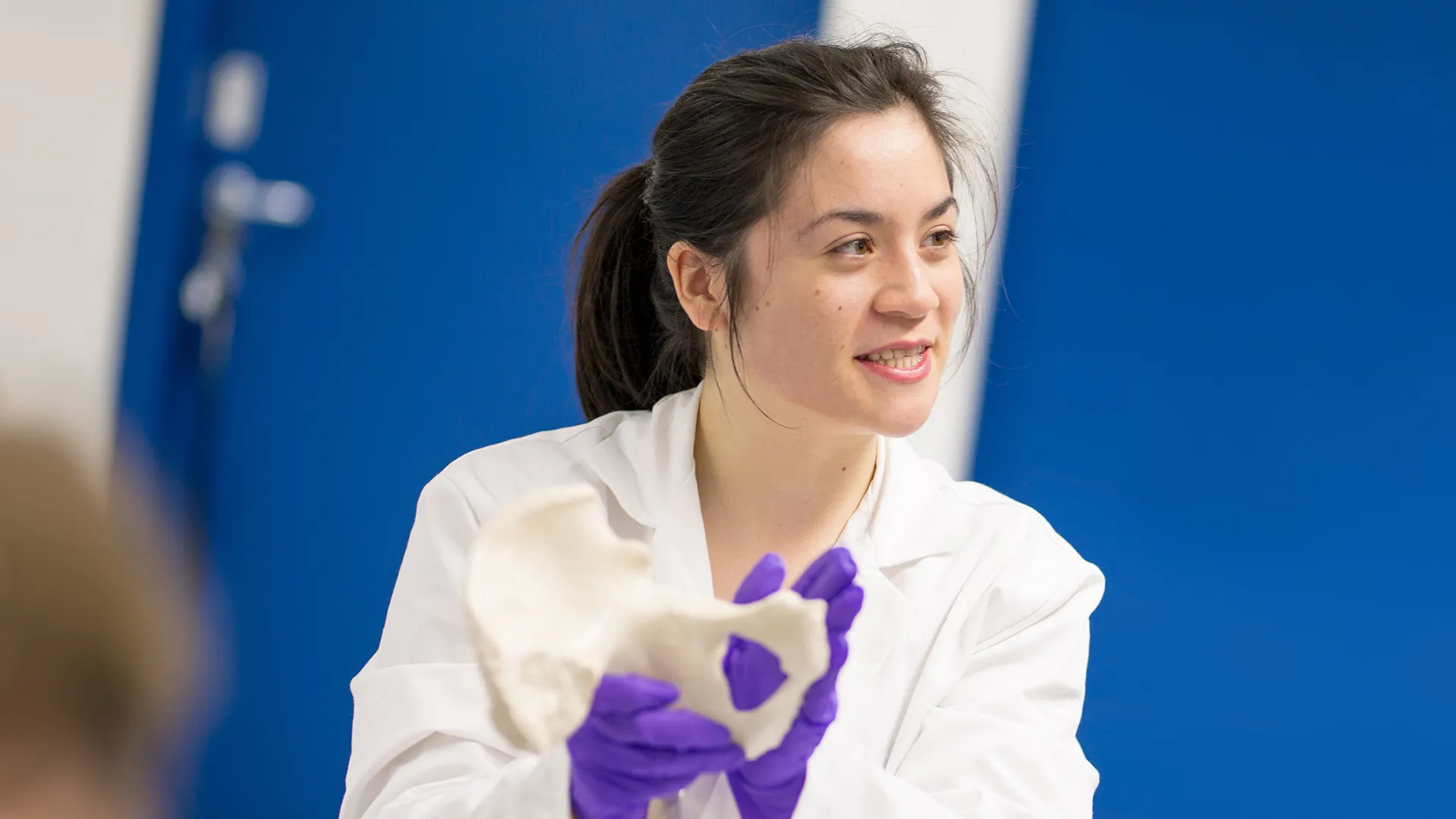Clearing is open. Apply now or call +44(0)1382 386386
Forensic Anthropology BSc (Hons)
You'll gain in depth knowledge of the human body to analyse and identify human remains for medical and legal purposes

Start date
September 2025
Duration
4 or 3 years
UCAS Code
FL46
Location
Dundee City Campus
2nd in the UK for Forensic Science
The Guardian University Guide 2026
Forensic anthropology is the analysis of human remains for medical and legal purposes. This includes:
- establishing identity
- investigating suspicious deaths
- identifying victims of mass disasters.
It's a specific field in forensic science. It requires in-depth training in anatomy and skeletal osteology (the study of bones and the skeletal system).
The course focuses on human anatomy. Identifying the dead depends on both hard tissue, like bones, and soft tissues, such as muscles. You will learn to dissect using our Thiel-embalmed cadavers. These cadavers are embalmed in a way that retains lifelike qualities including flexibility and colour, which will help you explore the human body and its functions in great detail.
You’ll also have access to our large collections of adult and juvenile skeletons. You will get hands-on experience with skeletal remains. You’ll focus on recovery, identification, and analysis. This will happen through real-case scenarios.
This degree provides you with specialised skills that employers value in:
- forensic science
- archaeology
- police and criminal investigations
- research.
Fieldwork and projects with forensic experts give insight into professional practice. You will also use advanced imaging technology. Throughout the course, you will gain key skills for forensic casework and research.
Increased employability
A Forensic Anthropology degree from Dundee gives you valuable skills for your career. You will get hands-on experience in a range of labs. This will help you build strong research and analytical skills.
Working in groups during your degree helps you build teamwork and leadership skills. These skills are very valuable for many careers.
We will help you build your curiosity. You'll learn to solve problems, plan, and stay resilient in different case scenarios.
The degree covers a wide range of topics. In your first two years, you will study physiology, biochemistry, and biological anthropology. This builds a strong foundation for your future.
In later years, you'll study anatomy. This gives you a clear understanding of the human body. Forensic anthropology and many other careers depend on this knowledge.
Applying this knowledge to forensic science then opens up many areas of work with a focus on science communication. These skills help you in many fields. You can work in areas such as:
- forensic science
- police service
- archaeology
- healthcare
- education
- humanitarian work.
You can also choose to continue your studies. Our Careers Service is also available to help with securing work during and after your degree.
Passionate teaching
At Dundee, you’ll learn from experts who are world leaders in forensic anthropology and archaeology. Our staff collaborate with Police Scotland on a regular basis. They use real-world experiences to guide their teaching.
We were the first UK university to use Thiel embalming. These cadavers are flexible and realistic. They help you analyse soft and hard tissues. This technique provides you with advanced knowledge and practical skills.
Our staff are passionate about teaching and will support you throughout your studies. Small class sizes and hands-on learning will help you apply what you learn to real forensic cases. Our staff are described as approachable and supportive by students, and will promote your well-being and resilience alongside developing your academic skills.
Student community
You’ll join a friendly and supportive community at Dundee. Small classes allow staff to get to know you and provide tailored support. There are regular meetings between staff and students to improve the student experience.
You can also our vibrant student society, AHID (Anatomy and Human Identification). Here, you'll connect with peers who love forensic science just like you. From study groups to social events, there are plenty of ways to connect. Together, you’ll build friendships and networks that will support you now and in the future.
Visit our Facebook page for the latest news from the Centre for Anatomy and Human Identification (CAHID).
View our full range of undergraduate courses at CAHID

“Studying at Dundee has given me an invaluable opportunity to learn and apply knowledge from case-active staff.”
Lilly Dan, Forensic Anthropology graduate
Rankings
5th in the UK for Anatomy and Physiology
The Times and The Sunday Times Good University Guide 2025
Contact our enquiry team
If you have any questions about the admissions process, studying, or living in Dundee, please contact us